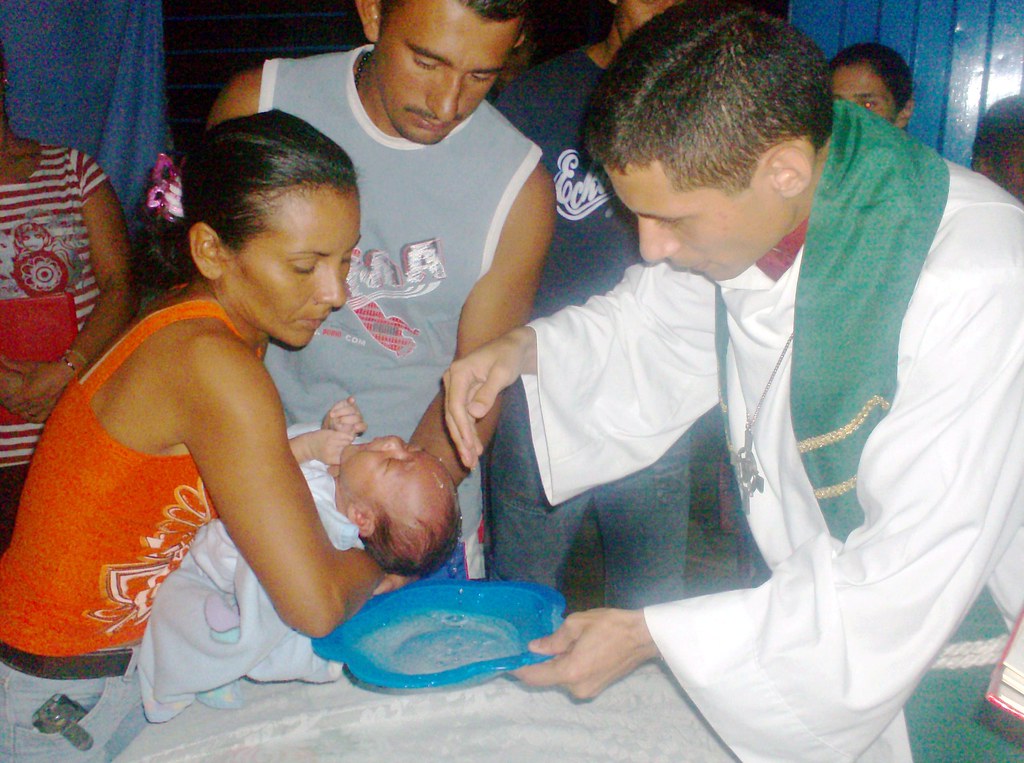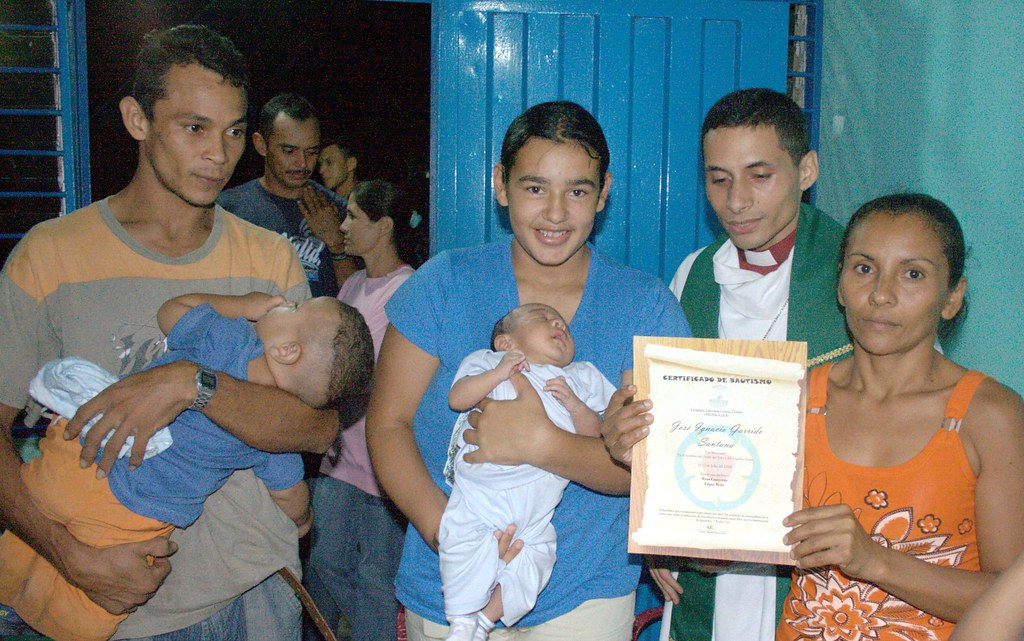 José
JoséIgnacio Garrido Santana was baptized Friday, July 18, 2008, by Pastor Miguelángel Pérez. We had been talking about having him baptized in another month or so, after the baby had to undergo surgery, we decided to have him baptized immediately upon release from the hospital. Miguelángel made a special trip from Barquisimeto Friday afternoon, baptized José Ignacio that evening and returned home Saturday morning. He is the youngest of Luz María's seven grandchildren and the eleventh person to be baptized at our mission in La Caramuca.
José Ignacio spent four or five days in the hospital and only his mother, Sarai, was allowed to see him. The problem seemed to be some obstruction in the passage to his stomach. There were members of both sides of José Ignacio's family present and also friends of the family. We celebrated his baptism and return home with soft drinks, cake and Jello. I never have in my life cared much for Jello, despite it being a staple in the German- and Scandinavian-American communities in which I was raised. Nevertheless, Jello also is a favorite in Venezuela, and you seldom get cake or ice cream without Jello.
 At any rate,José Ignacio is recuperating after a tough spell. The occasion of his baptism was oddly appropriate for the text for my July 20 sermon in Corpus Christi, Romans 8:28-30.
At any rate,José Ignacio is recuperating after a tough spell. The occasion of his baptism was oddly appropriate for the text for my July 20 sermon in Corpus Christi, Romans 8:28-30.Romans 8 is full of hope and assurance. The chapter begins by saying,"There is now no condemnation to those who are in Christ Jesus, who do not walk according to the flesh, but according to the spirit. For the law of the Spirit of life in Christ Jesus has made me free from the law of sin and death" (Romans 8:1-2 New King James Version).
Likewise, St. Paul closes Romans 8 with these words: "For I am persuaded that neither death nor life, nor angels nor principalities nor powers, nor things present nor things to come, nor height nor depth, nor any other created thing, shall be able to separate us from the love of God which is in Christ Jesus, our Lord" (Romans 8:38-39 NKJV).
Verse 28 also begins with consolation: "And we know all things work together for good to those who love God..." , but then introduces a most difficult concept, "...to those who are called according to His purpose."
Verses 29-30 continue with this theme: "For those He foreknew, He also predestined to be conformed to the image of His Son, that He might be the Firstborn among many brethren. Moreover whom He predestined, these He also called, whom He called, He also justified, and whom He justified, these He also glorified."
People often ask how, if God is both all-powerful and compassionate,can he allow the degree of suffering and death that there is in the world? Why do children starve to death, while other people live to a ripe old age? Why do a few survive earthquakes, floods, wars and other catastrophes while hundreds, thousands, perhaps millions do not?
To these types of questions, the Bible simply tells us to trust that God is sovereign over His creation, knows what we cannot understand, and actually does not owe us any explanations. As He said to Job in his suffering:
"Where were you when I laid the foundations of the earth? Tell me, if you have understanding. Who determined its measurements? Surely you know! Who stretched the line upon it? To what were its foundations fastened? Or who laid its cornerstone, when all the morning stars sang together, and all the sons of God shouted for joy?" (Job 38:4-7 NKJV).
We must trust that God has ordered all things for the ultimate good and that He will balance all accounts:
Moreover I saw under the sun: In the place of judgment, wickedness was there; and in the place of righteousness, iniquity was there. I said in my heart, God shall judge the righteous and the wicked, for there is a time for every purpose and for every work" (Ecclesiastes 3:16-17 NJKV).
This is not all that hard to accept. This world is the way it is, full of suffering and death, whether we believe in God or not. We all die, sooner or later. Nothing in this world lasts forever, whether good or bad. In the midst of our trials, it is comforting to believe
that there is a just and merciful God who places both our pain and our joys in a broader context.
Furthermore we know that God is not capricious for He has created an orderly world where certain outcomes are predictable. (For instance, if I build my house below sealevel in a coastal area where hurricanes appear annually, I should not be shocked when disaster strikes.)
But here is the more difficult question. What are we to make of what's hinted at in Romans, chapter 8, more so in chapter 9 and other passages such as Matthew 20:1-16 and Matthew 22:1-14? That God sent His only-begotten Son into the world to suffer and die, so that all who believe in Him might have eternal life, but that the number who actually gain eternal life will be smaller than all for whom Christ sacrificed Himself?
How do we reconcile "God...desires all men to be saved and to come to the knowledge of the truth" (1 Timothy 2:3-4) with "He chose us in Him before the foundation of the world...having predestined us to adoption as sons by Jesus Christ to Himself, according to the good pleasure of His will" (Ephesians 1:3-4)?
To be more specific, why if God wills all to have eternal life in His name, why are some among "the elect" from before the foundation of the world and others not? This is the unsettling implication of salvation by grace alone. If we are saved solely through God's grace, not by any
worthiness or action on our own part, why are we sinners saved and others, no less deserving of God's judgment than ourselves, damned for eternity?
In this case also we must accept by faith something the Bible affirms without explanation. We must not try to reduce a mystery of God to something that human reason can comprehend. The Bible speaks of an election to grace, but not of an election to damnation. We are saved wholly through God's
action, but the damned are lost through a rejection of the Holy Spirit for they alone are responsible, and not by divine decree.
The point of these verses about predestination is to assure us that our salvation from sin was part of God's purpose for our lives from the beginning, that God is faithful to His promises and will not abandon those whom He has chosen as His own. His grace is both universal (revealed in visible form to all humanity when Jesus died on the cross) and particular (revealed to each of us specifically in the sacrament of baptism).
Thus, we thank God that José Ignacio has received divine grace and the regeneration of the Holy Spirit through the Word and water of baptism. Throughout his life he will be able to recall the day he was baptized and know that redemption may always be his.
Preschool graduation
Another semester of the Venezuelan school year has passed and four children have graduated from our preschool. Next semester (which begins in September) they will begin first grade. This semester's graduates are:
- Carlos Morales
- Jesús Enrique Piñero
- Esther Cuevas
- José Gregorio Meza
Cultural celebration
On Sunday afternoon, July 20, the Sunday school children participated in a "cultural celebration" within the community (essentially it was a big talent show). The children sang songs they had learned in Sunday school.
No comments:
Post a Comment